Nozamile Yaphi's husband returned home from the mines suffering from TB. They started a suvvessful commercvial farming enterprise which eventually collapsed after he died. She now helps out at a local creche while trying to get compensation for her husband's occupational disease. (Lucas Ledwaba/Mukurukuru Media)
In the weeks before her husband eventually died from silicosis, Nozamile Yaphi spent sleepless nights gently rubbing his chest to ease his pain as he coughed up blood.
“He had iphika. I was nursing him here at home. It was painful, very hard. I was bathing him. My children were assisting me because he was helpless,” Nozamile recalls.
The term iphika is repeated in many households across rural Eastern Cape. It refers to a condition that includes chest pains, coughing and shortness of breath in isiXhosa.
The backyards of rural homesteads sprawled across the great hills of the province are dotted with graves of thousands of men who in the last 100 years died from iphika, a condition generally associated with returning gold mineworkers.
“I used to rub his chest all night because he was coughing non-stop. Sometimes I would fall asleep while rubbing him,” she says from her home in the village of Hombe near Lusikisiki in the Eastern Cape.
Eventually one night in July 2001, after months of suffering, Zamekile James Yaphi died in the arms of his wife. The eldest of their four children was 14 at the time, and the youngest only four years old.
“My children were deeply traumatised by this. They never stopped talking about this experience. We lost all hope. It was as if it was the end of everything. We were supposed to undergo counselling after that. But we did not get any counselling. It helped that we are believers,” says Nozamile, who attends the Faith Mission church.
After his return home from the mines in 1995, Zamekile and Nozamile had started a successful small-scale commercial farming enterprise. But following his death the business collapsed, plunging her into deep financial difficulty, a fate suffered by many iphika widows whose husbands were sole breadwinners and supported extended families.
Since the gold rush of the Witwatersrand in 1886 and the resultant industrialisation boom, villages such as Hombe have been forced to serve as a conveyor belt of cheap labour for the mines.
As a result, thousands of men like Yaphi made the long trek up north to spend the best years of their young lives working underground on the gold mines.
Years later they returned home as wrecks, sickly, with terminal lung diseases such as TB, phthisis and silicosis (iphika).
Now the widows of iphika, such as Nozamile, are left to carry the burden of raising families, relying only on the state’s welfare payments. The men who sweated to enrich the mining companies left them nothing much in the form of money.
As a result, life for the women who live daily with grim memories of sleepless nights of endless coughing, of nursing helpless men who eventually died in their arms is a great struggle.
A court settlement between lawyers representing former gold mine workers and their beneficiaries in 2018 led to the establishment of the Tshiamiso Trust. The Trust’s mandate is to process and compensate an estimated 500 000 former gold mine workers who suffer or died from TB and silicosis, and their beneficiaries.
With most former workers who were sole breadwinners having long died, the agonising wait for compensation is taking its toll on families.
In Nkunzimbini village, Manziwa Princess Ntshangase, a widow, is deeply distressed and somewhat confused talking about her late husband. Her hands tremble as she goes through the neatly packed pile of documents she keeps in a plastic bag.
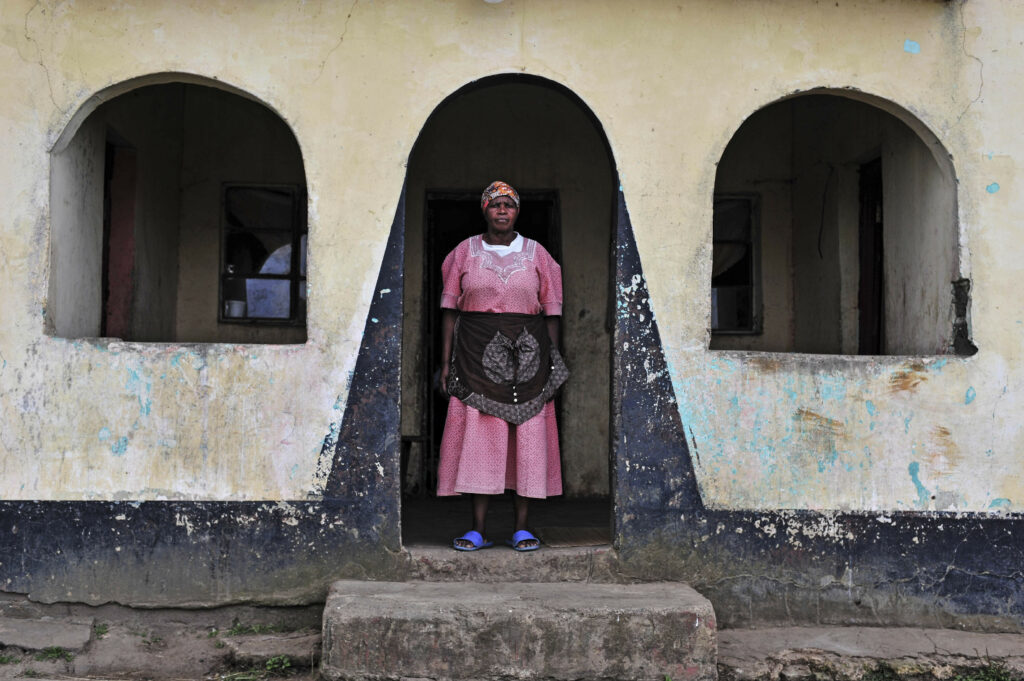 Precious Ntshangase’s home is falling apart and her family hardly has any food. Her husband worked on the gold mines for many years and came back home to die after contracting silicosis. (Lucas Ledwaba/Mukurukuru Media)
Precious Ntshangase’s home is falling apart and her family hardly has any food. Her husband worked on the gold mines for many years and came back home to die after contracting silicosis. (Lucas Ledwaba/Mukurukuru Media)They include a death certificate confirming that he died of natural causes, a faded green cover ID book, clocking cards, letters and other documents testifying to his life as a gold mine worker.
The crumbling walls of her cream-coloured earth-built home, broken furniture and empty cupboards lay bare the tale of her family’s dire financial situation.
“He had iphika when he came back home. He got it from the mines there eRhawutini [Gauteng]. But there was no money to take him to the doctors,” Manziwa says, tears welling up in her eyes.
She and her six children also carry the heavy memories of nursing her husband in his final days.
“His legs were locked towards his chest. He could not walk. I was nursing him here at home. I was very distressed. I was trying everything. Even the children were distressed,” Manziwa says.
She adds that they run out of food frequently and that things could have been worse if it weren’t for the state old-age pension she receives.
“We are forced to knock on the doors of neighbours,” she says as her daughter Babalwa rocks her seven-month-old baby to sleep on the veranda.
In Celegwane village, Mdukiswa Kwedinana’s grave behind the family’s home is hidden under an overgrowth of weeds. The grave of his son, also a former gold mine worker who the family says died of iphika, lies a distance away hidden among the tall grass. The family’s homestead is in a similar state of neglect.
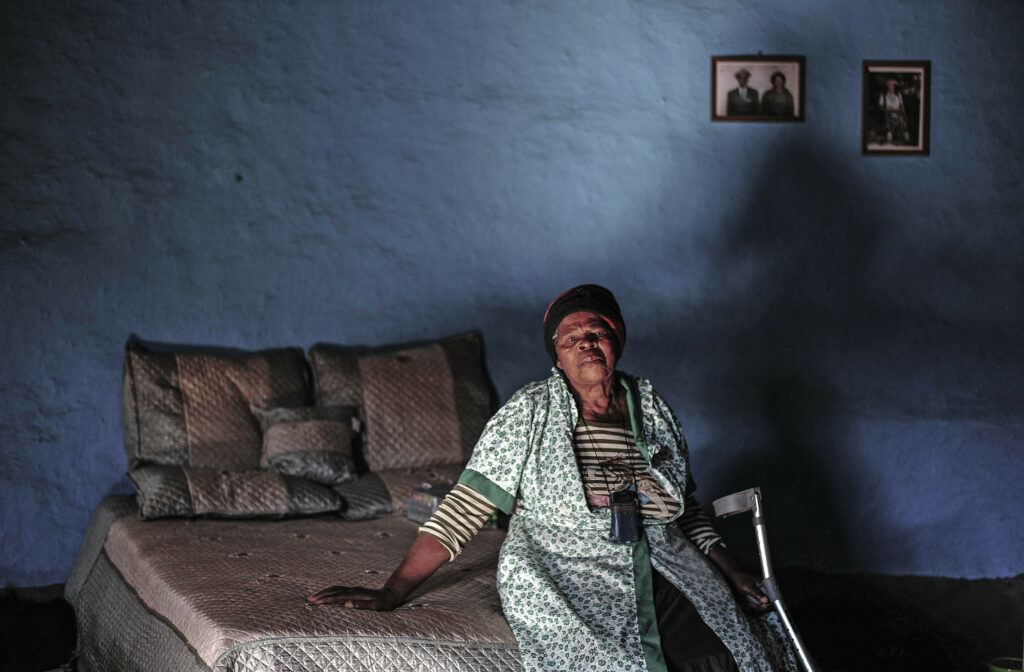 Mamsetyenzelwa Kwedinana has not received any compensation after her husband died from TB after working on the gold mines of the Free State and Johannesburg for over 30 years. She does not know the procedure to follow to claim her late husband’s benefits. She also does not know about the silicosis class action settlement or how to claim from it. (Lucas Ledwaba/Mukurukuru Media)
Mamsetyenzelwa Kwedinana has not received any compensation after her husband died from TB after working on the gold mines of the Free State and Johannesburg for over 30 years. She does not know the procedure to follow to claim her late husband’s benefits. She also does not know about the silicosis class action settlement or how to claim from it. (Lucas Ledwaba/Mukurukuru Media)“The roofs are leaking. The children are not attending school. Some had to leave the home and look for jobs that are not permanent. Some of them are struggling to get employment. I do not know what to do,” Kwedinana’s widow Mamsetyenzelwa says.
Her husband died in their home in 2011 after battling with iphika for a long time after his return from the mines.
“He was going in and out of hospitals and had swollen feet. And at times when I visited him in Johannesburg, I would find him in a hospital, with his feet swollen with sores. I would ask him why he had swollen feet.”
“When he took leave, I would nurse him and rub his feet with herbs, but these could not work. There was a bit of a relief on his feet after we took him to spiritual healers, but the coughing did not stop.”
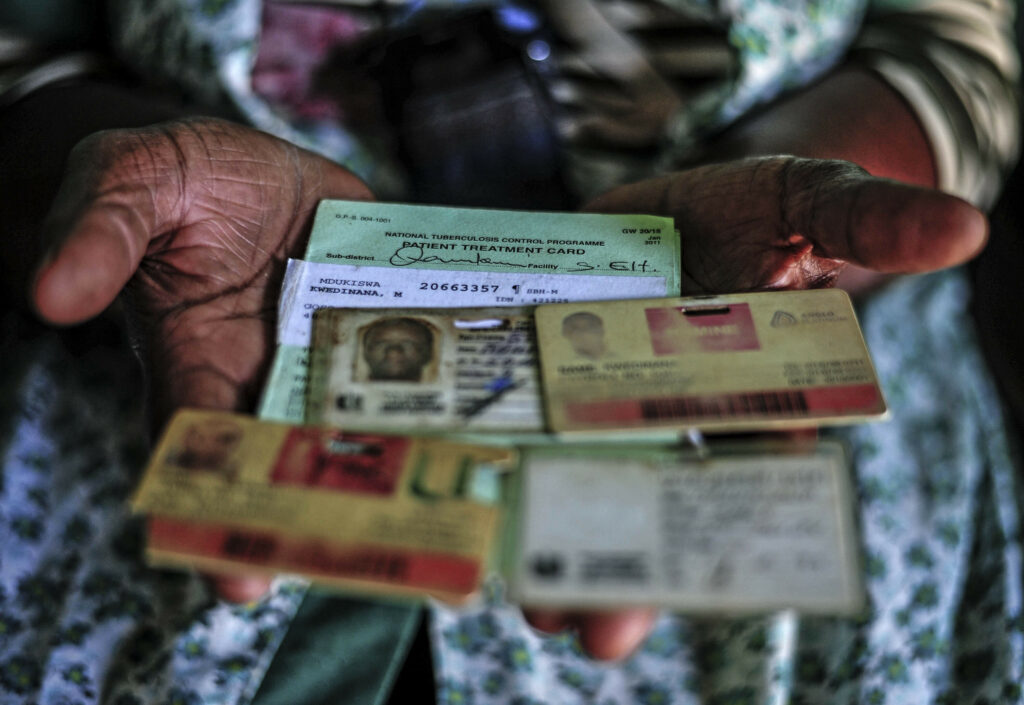 Mdukiswa Kwedinana’s family only have his work clocking cards and clinic cards to show for his many years working on the gold mines of the Free State and Gauteng. (Lucas Ledwaba/Mukurukuru Media)
Mdukiswa Kwedinana’s family only have his work clocking cards and clinic cards to show for his many years working on the gold mines of the Free State and Gauteng. (Lucas Ledwaba/Mukurukuru Media)Sometime in 1989 Nosapho Maphitshu got a letter from mining employment group Teba warning that she and her children urgently get tested for TB. Teba has now partnered with the Tshiamiso Trust to help the mine workers’ beneficiaries lodge claims against their former employers.
Their test was conducted at a hospital in Lusikisiki, about 25km from their home in Nkunzimbini village and came back negative. But her husband Mandla Maphitshu was diagnosed with the illness.
“He came back home in 2004 September. He started coughing badly in February 2005. From 2005 he was badly ill. He was going to clinics and to hospital. He died in hospital. He died from TB. It was in August 2006,” she says.
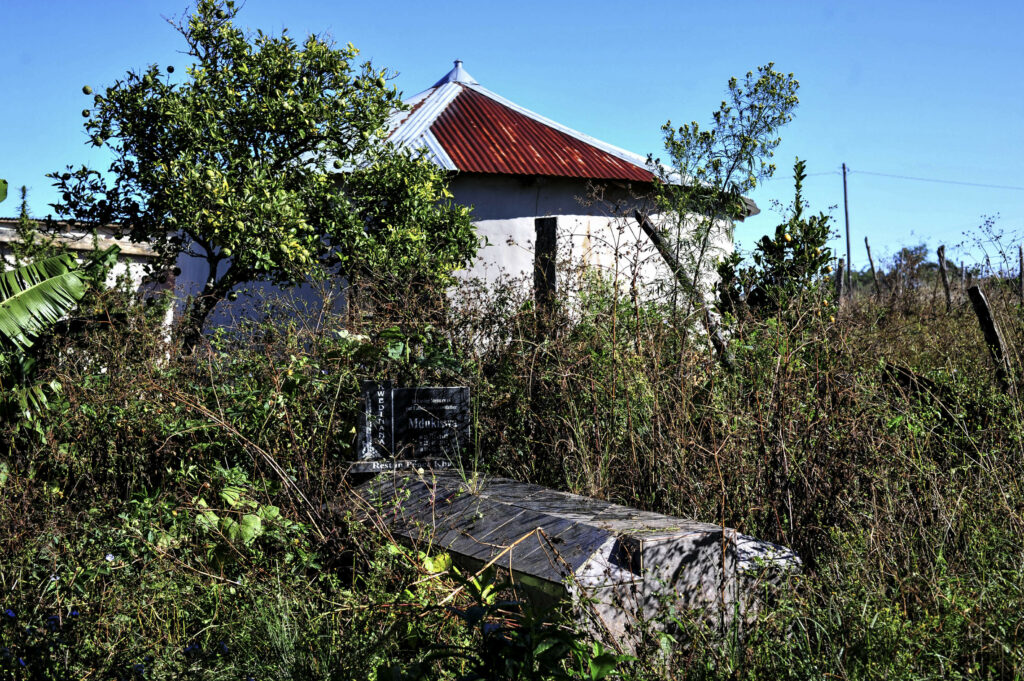 Mdukiswa Kwedinana was buried in the backyard of his homestead according to Amampondo custom. He left his job on the gold mines due to a searing pain in his chest and a nagging cough. (Lucas Ledwaba/Mukurukuru Media)
Mdukiswa Kwedinana was buried in the backyard of his homestead according to Amampondo custom. He left his job on the gold mines due to a searing pain in his chest and a nagging cough. (Lucas Ledwaba/Mukurukuru Media)At the time their eldest son was studying at university but had to eventually drop out to look for a job to assist the family. He is struggling to hold down a permanent job, but when he can, he sends the family some money.
“His brothers and sisters are also not working. There are no jobs. I have four other children who are still studying. Life is really tough,” she says.
Nosapho cultivates crops in her backyard to supplement the monthly R1 800 old-age pension she receives from the state. But is that enough to sustain the family, including her young grandchildren? She shakes her head slightly and laughs, before looking intensely into the distance. Tears well up in her eyes. She shrugs, a haunting look of despair on her face.
“We survive. We try,” she says. — Mukurukuru Media
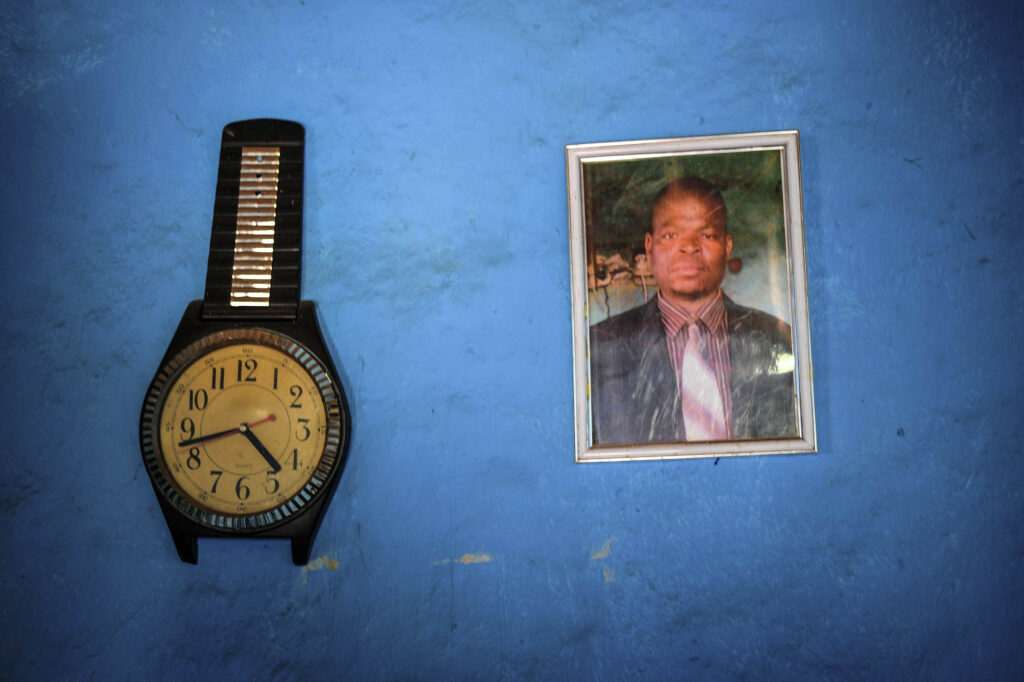 Mamsetyenzelwa Kwedinana’s husband died from silicosis after working on the gold mines. Her son whose picture hangs on the wall of the rondavel where she sleeps also suffered the same fate. (Lucas Ledwaba/Mukurukuru Media)
Mamsetyenzelwa Kwedinana’s husband died from silicosis after working on the gold mines. Her son whose picture hangs on the wall of the rondavel where she sleeps also suffered the same fate. (Lucas Ledwaba/Mukurukuru Media)
‘How long are we going to wait?’ The Tshiamiso Trust has paid only seven beneficiaries since February last year
When Nosapho Maphitshu went to lodge a claim with the Tshiamiso Trust in Lusikisiki in March, she was shocked to be told that according to their system, her husband, who had died in 2006, was still listed as alive in its records.
She was advised to return after a month, after which she was told the error had been rectified and she should wait for correspondence from the Trust in the next three months.
“I do not know what to expect from Tshiamiso Trust. Kufana nokufuna isitya ebumnyameni,” Nosapho said, using an isiXhosa expression loosely translated as “looking for a dish in the dark”.
“It has been a long time. I have been going to the Teba [The Employment Bureau of Africa] offices for so many years. I even got tired of it. From 2006, I have never received anything from Teba,” said Nosapho, the widow of former gold mine worker Mandla Maphitshu, who died in 2006.
Tshiamiso’s lodgement centres are located on the premises of Teba, which for many years served as a recruitment agency for the mines.
Tshiamiso’s spokesperson, Monako Dibetle, said Teba opened its first 50 lodgement offices by 15 February. The number is now up to 54 and “will extend significantly further”.
Tshiamiso was founded in February 2020 in terms of a class action settlement agreement concluded between six mining companies, some of their affiliates, the claimants’ representatives, and the claimants’ attorneys.
The settlement reached in the Johannesburg high court in 2016 covers employees who worked on the cited mines for a period of two years or more between 12 March 1965 and 10 December 2019 and who contracted silicosis or TB due to their work.
Tshiamiso is expected to be functional for at least the next 12 years, during which potentially eligible claimants will be able to submit claims.
Its mandate is to pay compensation to an estimated 500 000 ex-gold miners across southern Africa including Lesotho, eSwatini, Botswana and Mozambique, which also served as labour forwarding areas for the gold mining industry.
The legal settlement followed protracted litigation instituted separately in London, Johannesburg and East London. A settlement reached in London between lawyers representing 4 365 ex-mine workers against Anglo American and AngloGold Ashanti led to the establishment of the Qhubeka Trust.
Tshiamiso has announced it has received more than 20 000 claim lodgements for compensation. But there is widespread concern about the slow pace of processing payments by Tshiamiso, which announced in December it had paid seven beneficiaries as part of a pilot project.
“The long delays of compensation are more devastating to claimants hence they use their Sassa grants to feed their children and to support in school affairs of their children. These families are suffering a lot and the conditions in which they live is not conducive for people with TB and silicosis, especially in this time of Covid-19,” said Ndumiso Mtshulwana of the Justice for Miners Campaign.
Mtshulwana knows the challenges facing former mine workers and their families too well. He visits their homes and fields calls from them daily through his activist work for the campaign.
The Justice for Miners Campaign “advocates for the payment for just compensation for miners who contracted silicosis and TB as a result of working on South African gold mines.”
Tshiamiso’s Dibetle said the time it takes to process a claim will depend on how complete the documents lodged are, and whether a benefit medical examination is needed. He said Tshiamiso is seeking to ensure that even the most complicated claim takes no longer than six months from date of lodgement.
“Most will be finalised more quickly. And we expect that as the system becomes better with experience, these time frames will reduce,” he said.
But Mtshulwana warns that the situation on the ground is dire and many people are on the brink of despair.
“People on the ground have no trust in Tshiamiso Trust since they are situated on the Teba premises. Many [of the] ex-employees have no confidence in Teba who is pocketing even their last cent,” charged Mtshulwana.
He said he had received complaints from people claiming they were being charged cash amounts of up to R100 by Teba/Tshiamiso employees in order to produce their documents of service records.
Dibetle warned that “if any staff contracted to Tshiamiso are charging claimants fees for anything they would face disciplinary action.”
Mtshulwana, who is based in Lusikisiki, challenged the picture of an efficient service painted by Tshiamiso in the media.
He cites the difficulty in accessing the Tshiamiso Trust offices especially by senior citizens located in remote villages, and a lack of adequate provision of information to claimants, some of whom are not well-versed in the workings of the law.
“People are not informed about the steps of making claims, people [are] being told that their claims are declined if they were paid the statutory claim by the Medical Bureau for Occupational Diseases [MBOD],” he said.
The MBOD pays out former workers who contracted TB and silicosis as per legislation. Tshiamiso Trust is meant to compensate ex-workers and beneficiaries represented in the class action.
The Tshiamiso Trust further contends that those paid out via Qhubeka do not qualify to claim under it, but the Justice for Miners Campaign disputes this.
One of the challenges facing both former workers and their beneficiaries appears to be a lack of understanding with regards to who qualifies for compensation under Tshiamiso.
Dibetle said Tshiamiso has carried out a range of communications efforts to this effect.
“The court-approved settlement agreement also helped with multi-million-rand radio and newspaper advertising efforts. We are aware that there is more to be done,” he said.
But given the prevailing lack of information among ex-mine workers and their beneficiaries on the ground, it is not clear if these efforts were successful.
Dibetle said even before Tshiamiso came into existence, some 130 000 prospective claimants had registered an interest in claiming, online, through Teba and through the call centre whose services the trust uses.
Mbulelo Xhonti is among many of those waiting for news from the claims they made through Teba. His father, Nonkwedu Anderson Lukwadu, died from TB in 2015.
Xhonti has never heard of the Tshiamiso Trust. Two years ago, he was nearly scammed by someone who wanted him to part with money so he could process his claim.
“I chased him away. I told him I did not even want to hear from him ever again,” says Xhonti.
Tshiamiso has warned about scammers who solicit cash from people with promises of helping to process their claims.
“We took his documents to Teba (after his death). But we have not received any money. We were told people who had iphika from the mines would get around R500 000 depending on their condition,” said Xhonti.
Mtshulwana said Tshiamiso should do more to track down people like Xhonti who have no access to internet services.
“We thought Tshiamiso Trust will buy tough vehicles that will track claimants from various villages. We thought they will hire people with experience in working with ex-miners associations and those who worked with different law firms that represented ex-miners in the litigation.
“The pace in which Tshiamiso is helping the claimants is very slow. In a way one would think they are delaying processes because they bought into mining companies’ ideas and arrogance as mining companies have no interest to pay claims,” charged Mtshulwana.
The frustration of the long wait for compensation is perhaps best echoed by Nozamile Yaphi, whose husband died in 2001 from tuberculosis.
Nozamile says she never received any benefit payout after her husband’s death. Last year she filed a claim through the Teba offices in Lusikisiki but has not heard from them since. She asked: “How long are we going to wait? Where are the people that Tshiamiso Trust has paid out? Is there hope that Tshiamiso will get the money to the people? We have been hearing for a long time that Tshiamiso will pay people, it’s a song we have been hearing for a long time. Tshiamiso Trust has people’s money, when is it coming?” – Mukurukuru Media
Who exactly is Teba?
The Employment Bureau of Africa (Teba) was established in 1902 as a recruitment agency for the gold mines of the Witwatersrand. The agency worked with traditional leaders, the apartheid government and mining houses to source cheap labour from areas such as the Transkei, Lesotho, Swaziland, Mozambique, Botswana and Malawi.
Teba opened recruitment offices in areas such as Lusikisiki, Mthatha and Maseru, among others, where men forced out of their villages through unjust taxes and other laws enlisted for the mines. According to its own records Teba recruited more than 500 000 mineworkers from its founding to 1987.
After 1994 the agency diversified to assist mineworkers with programmes that included screening for TB and silicosis and processing their labour and medical claims with the authorities.
In 2005 the National Union of Mineworkers founding president Dr James Motlatsi bought 75% of Teba, with 25% of shares given to its employees. — Mukurukuru Media
This article was possible due to the support of the German Federal Foreign Office and the IFA (Institut für Auslandsbeziehungen) Zivik funding programme. The views presented here do not represent the views of the German Federal Foreign Office nor the IFA